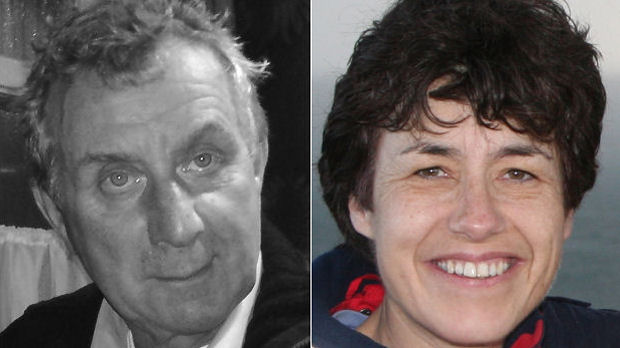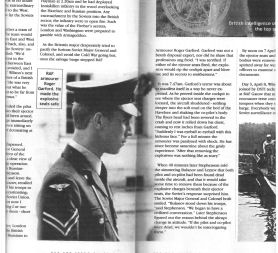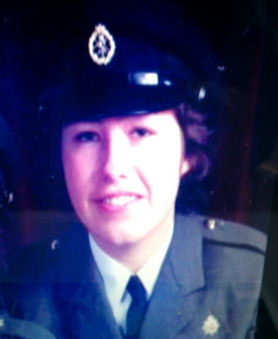Britain’s own ‘Don’t ask, Don’t tell’ story
Exclusive: Barack Obama repealed the “Don’t Ask, Don’t Tell” ban on openly gay US soldiers this week. Channel 4 News reveals two former British personnel were offered MoD compensation for their cases.

The news came after both the Senate and the House of Representatives approved the repeal of the “Don’t ask don’t tell” law, which banned gay men and women from serving openly in the US armed forces.
Signing in the law and delivering on an election campaign promise, Barack Obama said: “I am proud to sign a law that will bring an end to ‘Don’t Ask, Don’t Tell’.
“This law that I’m about to sign will strengthen our national security and uphold the ideals that our fighting men and women risk their lives to defend,” he said.
The new law will be gradually eased into the service, but Obama said “We are not dragging our feet to get this done.”
I am proud to sign a law that will bring an end to ‘don’t ask, don’t tell’. US President Barack Obama
Channel 4 News has spoken exclusively to two former British service personnel who were discharged from the military because they were gay, in the days when it was illegal to be a homosexual in the British Armed Forces.
The previous Ministry of Defence (MoD) position was consistent with domestic law, in terms of the Sex Discrimination Act 1975, or under European law, in terms of the Equal Treatment Directive.
Both fought for years through the courts to win compensation for the way they were treated by the military police and the MoD. They were offered limited amounts in compensation by the MoD, and until recently neither claimed the money, leaving it locked up in their solicitor’s vault.
Ministry of Defence statement
The Ministry of Defence would not comment on individual cases, but released this statement.
The MoD said: "The Ministry of Defence has long accepted an obligation to settle individual cases of this nature. Compensation was paid to more than 50 applicants and the levels of damages were consistent with the level of awards made by the European Court of Human Rights in similar cases."
MoD compensation cases
In March 2008, Roger Garford, Jean Macdonald won their legal battle for damages against the MoD, following a European Court of Human Rights ruling in 1999. But under the European system, it was left to the MoD to decide how much compensation it was obliged to pay.
Roger Garford claims he was “offered around £88,921” and Jean Macdonald claims she was “offered around £35,500”. Both had to pay a percentage of their damages in solicitors for fees. Jean Macdonald’s money, until recently, remained in the solicitors’ client account as she battled on for a more appropriate compensation payout. However after two years, due to financial problems, Roger Garford was forced to take his money out.
The Equality and Human Rights Commission could not help them any further in their fight for further compensation, stating in a letter to Jean Macdonald “taking action in this matter would not meet our current strategic objectives. In addition, considering the length of time since the disputes were heard by the European Court of Human Rights and also in consideration of our own resource limitations, I’m afraid we will not be pursuing further enquiries into this matter.”
Roger Garford and Jean Macdonald’s solicitor, Barbara Jordan, told Channel 4 News: “I can see absolutely no way forward within the justice system” for them.
They are now looking for other avenues that may be open to them, for example the Law Centres, to continue their fight for “just satisfaction” and an apology from the Crown for the way they were treated.

Roger Garford
Roger Garford is 66-years-old, lives in Peterborough and enlisted into the Royal Air Force on 14 September 1960 at the age of 16. He was on a 22-year commission.
His ambition had always been to serve till 1995 and then retire at the age of 55. But because he was gay, his ambition would not be realised.
He served in the Borneo campaign and was involved in the high-profile “Brixmis” Russian jet crash recovery in Berlin, 1966.
He was discharged from service as a Chief Technician at RAF Binbrook in Lincolnshire just over 100 days before his pension payments were due to begin, on 23 December 1983.
He says the Special Investigations Branch (SIB) of the MoD, the military police, investigated him for allegations he was homosexual. In those days it was illegal to be a British serviceman if you were gay – a law that would not be lifted by the MoD until 2000.
Roger Garford claims he was subject to four separate interrogations which each lasted five hours. He says he was forced to explain in graphic detail his sexual orientation and practices. Humiliated, distressed, he alleges he was forced to name partners he had been with.
I was forced by the interviewers to give names of men I had been with, which I regret to this day. Roger Garford
Roger Garford told Channel 4 News: “On the 23 March that year I was called to the Guard room to meet with two special branch investigators who told me they suspected I was gay.
“I was married at the time with two sons, living in the married quarters. They spent a day interviewing me over a period of eight hours. I felt as though they’d got me on my knees. Their interviewing technique was a bad cop/good cop scenario. You know, one goes out for a cup of tea, the other grills you.”
He claims the SIB investigators subjected him to intense interrogation which delved into extremely intimate details of his private life.
He said: “Their investigation went into very personal details. They asked me was I still having sex with my wife, what sort of sex? They got me down on my knees – I was in a desperate state and I was forced to give names of men I had been with, which I regret to this day.
“They specifically asked me about a civilian guy I’d been with. They asked me what sort of sex we’d had, whether I was passive or active, of which I hadn’t got a clue what they meant on that one at the time.”
Mr Garford claimed the interrogations were extremely intimidating and involved very personal, intimate and crude questioning.
He claims the investigators accused him of having a relationship with a male colleague, something he denied.
They said ‘You can forget the commission you applied for and you can forget your career.’ Roger Garford
He added: “They said oh you’ve been with ****** ******, who was a friend at the time at the base. I had not been with him, but they were intimating that I had been with him, but that is one thing I did refuse to agree to.
“I asked if I could go home to my wife. They said yes and so I went over for a bit of lunch. I told my wife what was happening and came back to the interview. It was walking distance away. At the end of the day they said we’ll look into this further. They said ‘you can forget your commission you applied for and you can forget your career.'”
He claims he was asked to return his medals to the MoD, which he declined to do. The MoD refused to comment on his individual case.
As a result of his discharge, his marriage broke down and he lost contact with his children. For a while he suffered from flashbacks and nightmares of the interrogations and he became an alcoholic for around a year.
He says he was refused resettlement training on discharge and as a result was in-and-out of employment for some time.
He said: “I lost my resettlement grant and also any resettlement courses. I was not allowed to go on any. It was approximately 120 odd days before my pension serving date. I was then on the dole for about four months.
“I began drinking quite heavily and split with my wife. I was basically slipping into a black hole. I then went with British Aerospace to Saudi Arabia for two-and-a-half years. I just needed to get away.
I would like an apology to say they were wrong in ruining a successful career. Roger Garford
“I was a real mess, psychologically, mentally and I suppose physically. The first few months after I’d lost my job, I lost my wife, my home. Those first few months of drinking I was in a real mess, but somehow I came to and climbed out of it. But the scars are still there, because I lost everything that was important to me, even recalling it now upsets me.”
He said: “It basically ruined my career and my life at the time. I had long service, good conduct medals which they asked me to return. I served in Borneo, had three commendations, and a Borneo campaign medal.
“Because I had quite a few commendations to my name there was a strong likelihood I would get a commission. In fact when I was called into the Guard room by the wing commander it was initially thought that I’d achieved the goal of getting a commission.
“I would like to think they would take a relook at things and offer us a bit more, especially the people who have challenged the MoD, because our legal costs have been around £20,000 each. I would also like an apology to say they were wrong in ruining a successful career.”

Jean Macdonald
Jean Macdonald is 53 years old. She joined the Women’s Royal Army Corps on 9 November 1977, aged 19. Nearly four years later she was discharged on 24 July 1981, when she was ranked as Lance Corporal.
She claims two female officers of the SIB came to her camp and called her in. The officers allegedly used “good cop/bad cop” techniques and searched her room, taking personal items, letters, posters and even her pyjamas.
Jean Macdonald told Channel 4 News: “I had a few experiences or encounters which led to a relationship with another woman. I was posted to Beaconsfield and up until that point had been involved a lot with the army, in sports teams etc. I was considered as a good physical training instructor so there were no problems.
“Then all of a sudden the Special Investigations Branch came onto camp. They carried out a witch hunt, trying to find and get rid of lesbians who were serving. A lot of undercover work was done. If someone was suspected their name was put on file and if it came up again they followed them and tried to catch them out.
They turned evferything in my bedroom upside down, taking my personal belongings, letters, photos, posters off the walls, and even my pyjamas. Jean Macdonald
“There was an ongoing investigation of two women on camp and I was told that my name had been put forward amongst six names. I was called up to the main headquarters and they had a tactic where two SIB officers played good cop/bad cop during the interrogation.
“They told me they would go down and search my quarters. They turned everything in my bedroom upside down, taking my personal belongings, letters, photos, posters off the walls and even my pyjamas. They took everything out in bin liners.”
Interrogated for six hours, she alleges she was not even allowed a break for the toilet or refreshments. She claims she was not informed of her right to have representation.
According to Jean the interrogators forced her to answer explicit questions regarding her sex life and practices. She claims threats were made to inform her mother and her alleged “gay” twin sister. She says they threatened to strip search her to find “love bites”.
She said: “They threatened me by saying they knew my twin sister was gay and said if I didn’t sign the discharge papers they would get her. They threatened to tell my mother. They said if I agreed to certain things that I would be safe. They said things like ‘if I was in the same situation I would have experimented…’ They basically convinced me I would be OK.
They asked a lot of very sexual and intimate questions, including about sex toys and stimulations. It was just very crude and disgusting. Jean Macdonald
“They threatened to take me to the medical block because they claimed I had love bites down my back. They asked a lot of very sexual and intimate questions, including about sex toys and stimulations. It was just very crude and disgusting really.
“I got to the point where I would have done or said anything to get out of the room. I was very young and I just felt I had no other option but to sign the bit of paper. All I admitted was having a drunken fling with someone – I’d ended up in bed with another woman and we both had our underwear on and that’s why they discharged me. I never admitted to being a lesbian because then I simply didn’t know.”
She told Channel 4 News she was ordered to see a psychiatrist and claims she was threatened by male soldiers too, whilst living in the mixed gender camp.
“I was also threatened on the camp by male soldiers as it was a mixed camp,” she said. “At one point they said they couldn’t guarantee my safety because some of the soldiers hated us.”